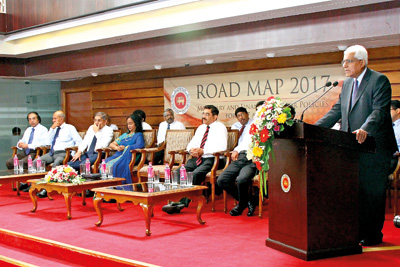Forensic audits on bond scams raise alarm bells, expose dealings between officials and private parties
The forensic audits conducted by two international consulting agencies – BDO and KPMG – on the issuance of Treasury bonds and government securities from January 2002 to end February 2015 covering the tenure of two governments, has opened a can of worms, exposing high officials particularly former Central Bank (CB) Governor Arjuna Mahendran and their links with private sector dealers and bankers and conniving to effect huge losses to the government and the Employees Provident Fund (EPF) while benefiting private sector dealers, particularly PTL.

Former Central Bank Governor Indrajit Coomaraswamy under whose purview the forensic audits were initiated, seen addressing a conference at the bank during his tenure.
The reports – six in total which were made public on Thursday – also examined the investments of the EPF in the stock market many of which resulted in losses in its return on capital and also examined the role of the former Central Bank Governor Ajith Nivard Cabraal during the period of these investments. Mr. Cabraal, the reports said, was unable to give an interview to seek clarification on the matters that arose during the investigation. BDO India presented five reports running to a total of 1,251 pages while the KPMG India report had 295 pages.
The investigators examined, computers, laptops, email conversations and voice recordings of telephone conversations, some of which appeared in the reports and others listed as annexures.
Mr. Cabraal, against whom strictures have been made in the reports, on Thursday dismissed the allegations. “This report is flawed because it was not done by an independent party but by those who are in power and responsible for the bond scam including the former Prime Minister and his associates. It should have been a completely independent investigation which is not the case here. In fact during 2012-2014, the EPF had made Rs. 14.6 billion in unrealised profits while at the time I left the bank, the unrealised profits amounted to Rs. 20 billion,” he said when asked to comment on the allegations.


